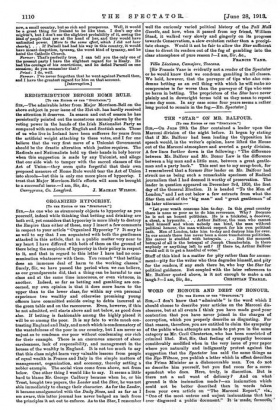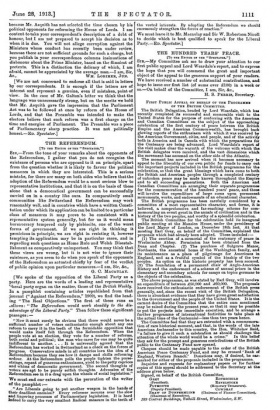WORD OF HONOUR AND DEBT OF HONOUR,
[TO THE EDITOE OF THE "SPECTATOR...]
SIR, —I don't know that " admirable " is the word which I should choose to describe your articles on the Marconi dis- closures, but at all events I think you have made good your contention that you have never joined in the charges of corruption, which you properly describe as disgusting. For that reason, therefore, you are entitled to claim the sympathy of the public when attempts are made to put you in the same category as Mr. Cecil Chesterton, who has been convicted of criminal libel. But, Sir, that feeling of sympathy becomes considerably modified when in the very issue of your paper where you naturally and indignantly protest against the suggestion that the Spectator has said the same things as the Eye-Witness, you publish a letter which in effect describes the Prime Minister as a dishonourable man. You do not so describe him yourself, but you find room for a corre- spondent who does. Here, truly, is discretion. But is there not a sad want of delicacy ? And on what ground is this insinuation made ?—an insinuation which could not be better described than in words taken from your own article on "The Marconi Report," viz., " One of the most untrue and unjust insinuations that has ever disgraced a public document." It is made, forsooth,
because Mr. Asquith has not selected the time chosen by his political opponents for reforming the House of Lords. I am content to take your correspondent's description of a debt of honour, but I am not prepared to accept his decision as to when it is due. You will not allege corruption against the Ministers whose conduct has recently been under review, because there are not sufficient grounds for such a charge, but you publish in your correspondence columns insinuations of dishonour about the Prime Minister, based on the flimsiest of pretexts. This is a distinction the delicacy of which, I am afraid, cannot be appreciated by the average man.—I am, Sir, [We are not concerned to endorse all that is said in letters by our correspondents. It is enough if the letters are of interest and represent a genuine, even if mistaken, point of view. In the case of Mr. Galton's letter we think that the language was unnecessarily strong, but on the merits we hold that Mr. Asquith gave the impression that the Parliament Act was to be followed at once by reform of the House of Lords, and that the. Preamble was intended to make the electors believe that such reform was a first charge on the time and energies of Parliament. The Preamble was a piece of Parliamentary sharp practice. It was not politically hones t. —ED. Spectator.]



























































 Previous page
Previous page